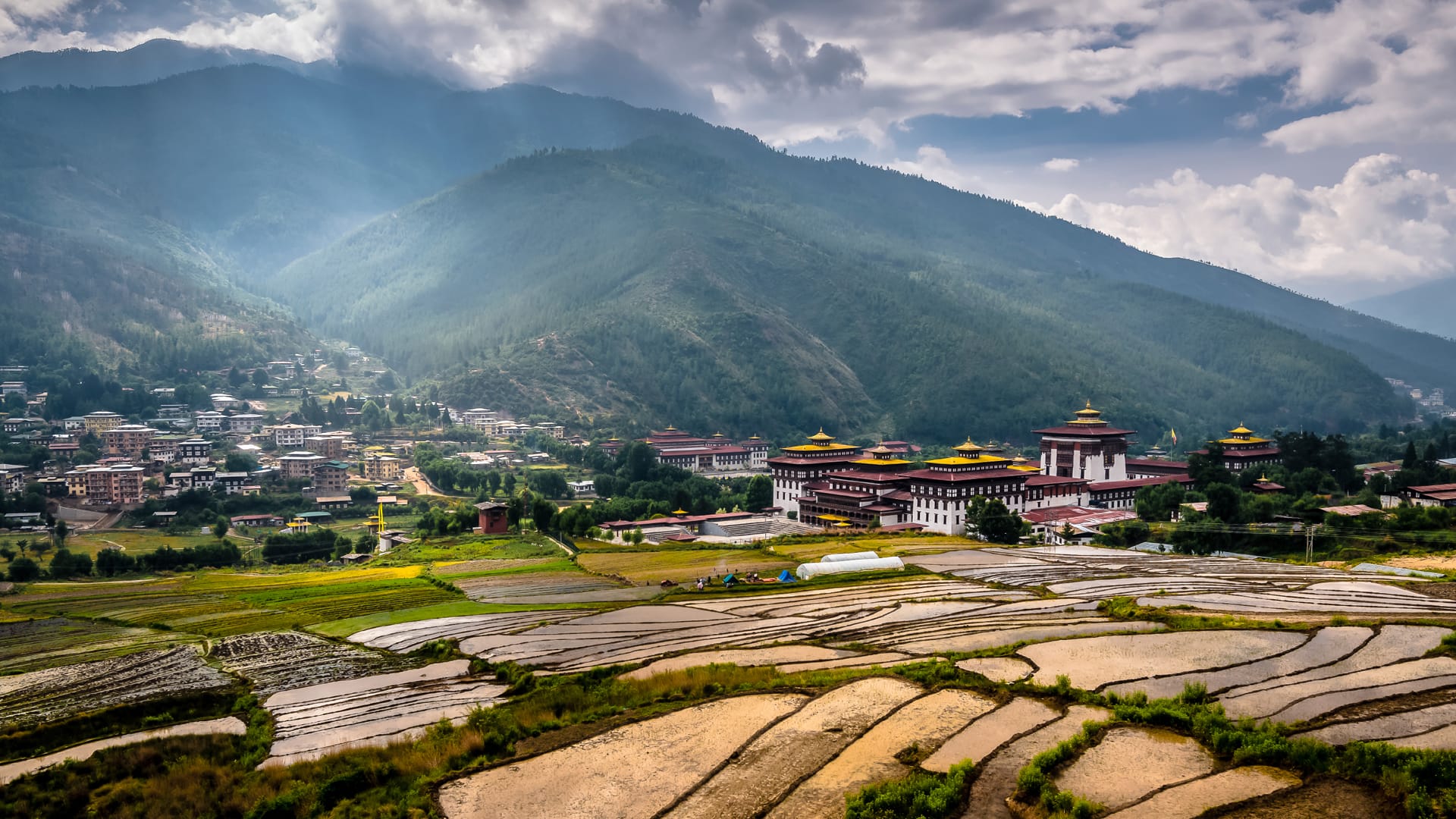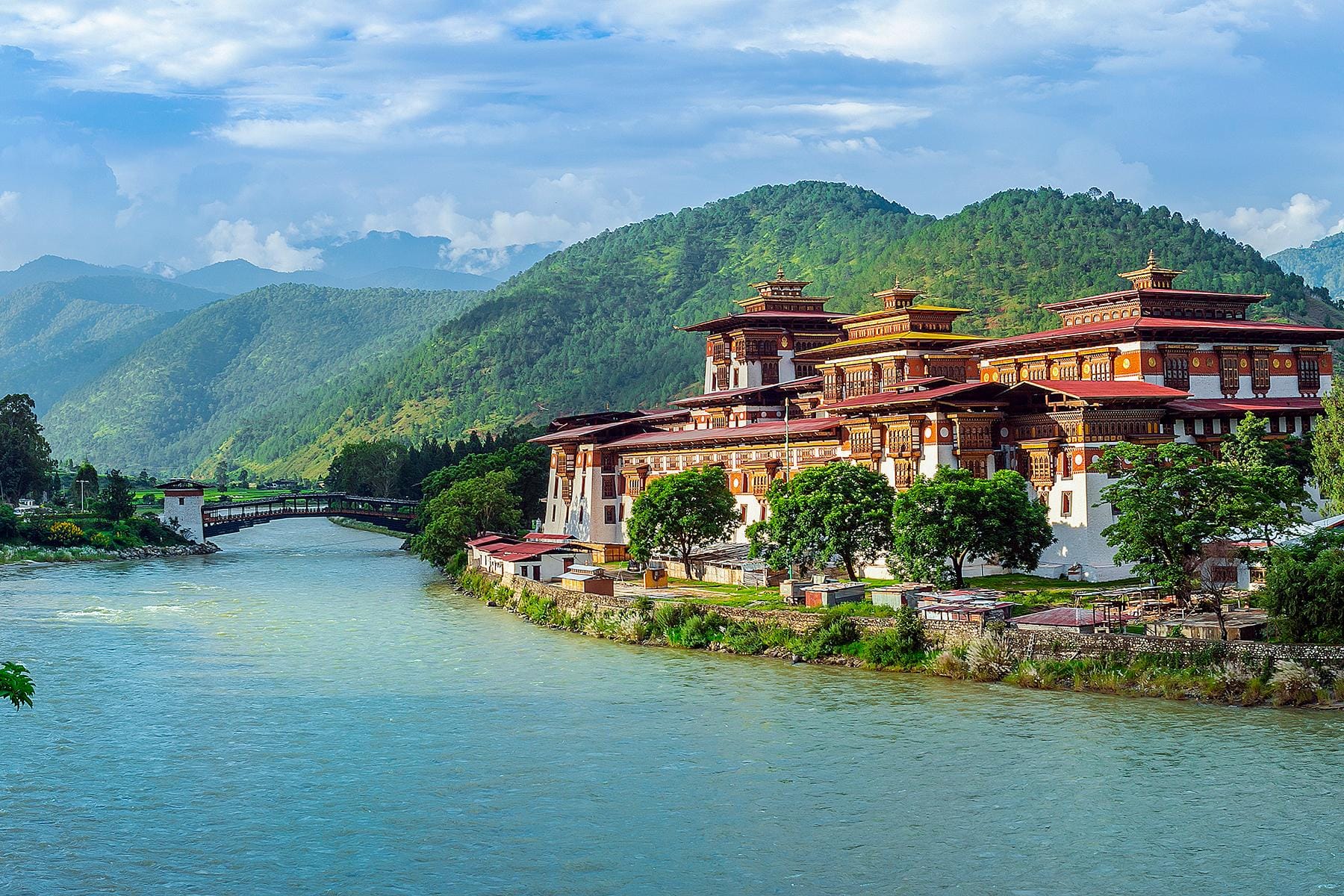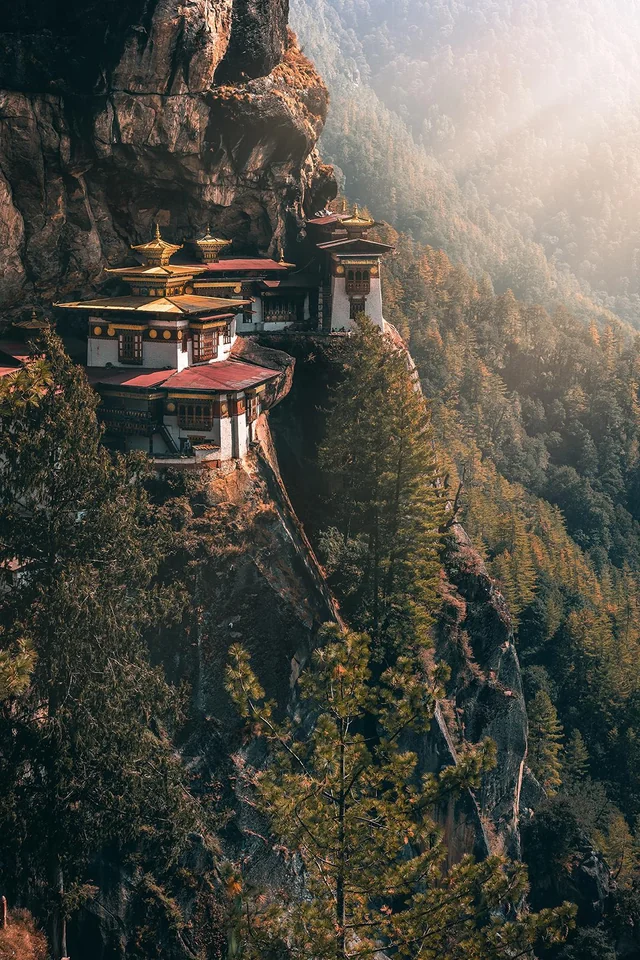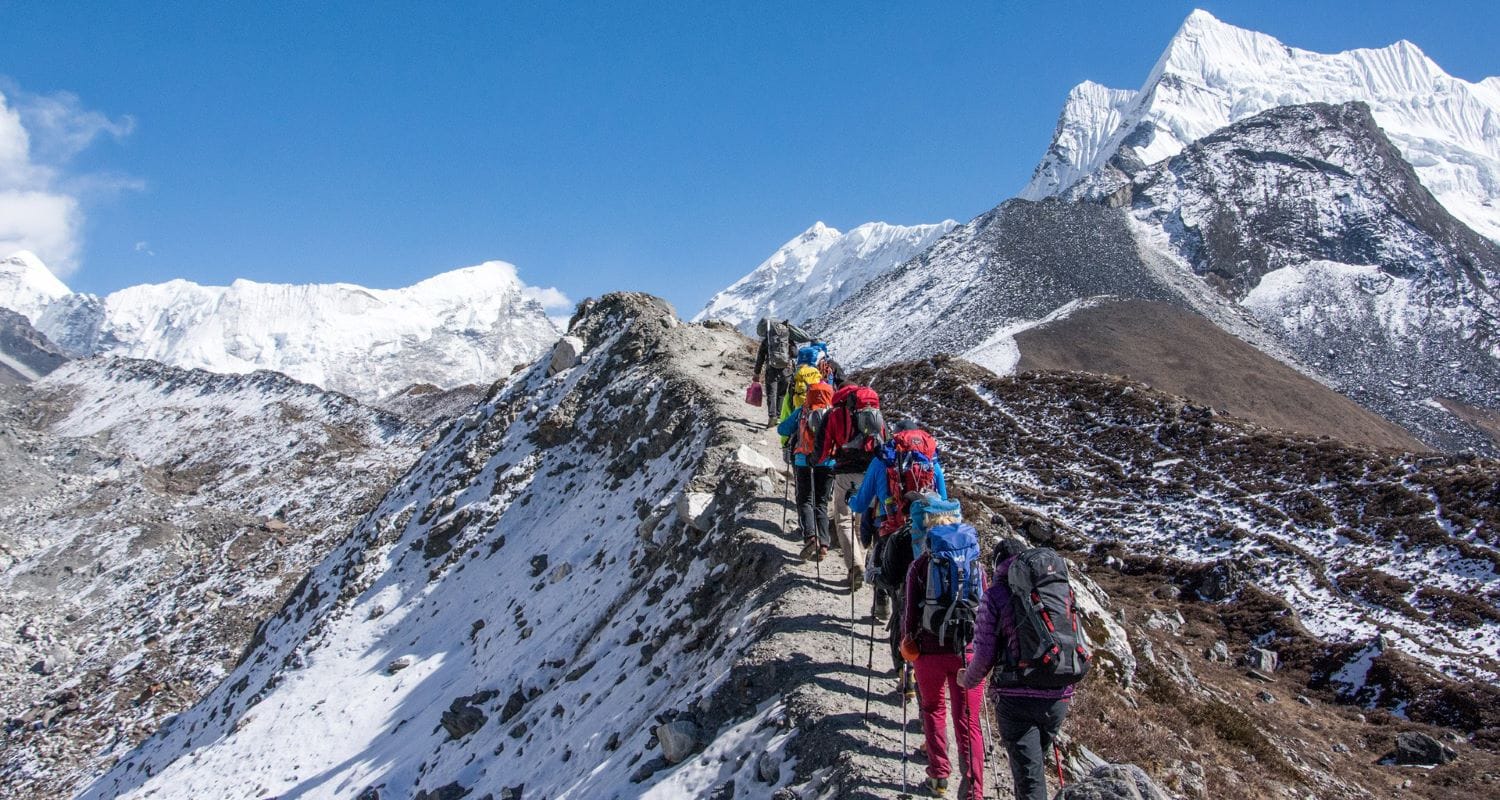Why Travel Bhutan
When you visit Bhutan, you will become one of the very few who will get to experience the natural charm and the mystical culture of the country where Gross National Happiness is deemed more important than Gross Domestic Product. By law, at least 60% of the country must remain forested for all future generations. You will experience Bhutan’s natural wonders first-hand when travelling the mountain passes – resplendent with rhododendron blossom in spring. Botanical riches and unique mammals and birds are protected in several national parks, and a mountain trek is one of the best ways to experience the Himalayas.
Lonely Planet ranked Bhutan the number one travel destination to visit in 2020. And it’s not hard to see why.
The kingdom, perched high on the mighty Himalayan range, is dotted with fluttering prayer flags, ancient Buddhist monasteries and welcoming smiles. It is one unique country, where there are no traffic lights, where GDP is replaced by the development philosophy of Gross National Happiness, where chilies are used as a vegetable, and where the king has taken upon himself to ensure the happiness of his people and to create a fertile ground from which they may cultivate the fruits of spiritual pursuit and attain good karma. Such is the beauty of Bhutan. It is truly special and explicitly enlightening.
An Abode Of Gods?
Bhutan is the last bastion of Vajrayana Buddhism, a spiritual practice that is known to be one of the most profound schools of teaching in the Buddhist world. The sacred monasteries that sit precariously on sheer cliffs, the fluttering prayer flags that line the high ridges, the red-robed monks who chant through the day and night, give the kingdom an aura that comes from another time.
The people of Bhutan have drawn a rich culture from this heritage and made it the essence of it’s unique identity. Bhutan has decided that man can only survive, and truly live, by being in touch with the past. The onslaught of globalization is balanced with the values that have kept human society together through the ages. It is no surprise that the main goal in life for Bhutanese people is happiness. Even the mandate of modern Bhutan is Gross National Happiness. In translation, this means that economic development, a goal for much of humanity, is only a means to the real goal of happiness.
The kingdom of Bhutan, today, may be man’s last unventured destination. That is how the Bhutanese people would like to keep it. Thus, the carefully controlled tourism policy of the government that says, in essence: take nothing but pictures, leave nothing but footsteps.

Where Happiness Matters
You will not find a more enlightening travel destination today. Perched high on the mighty Himalayan range, the kingdom of Bhutan has defied globalization and chosen to remain a hidden paradise, accessible only to few.
It was only in the 60s that Bhutan opened its doors to the outside world after centuries of isolation. Ever since, it has gained an almost mythical status as a real-life shangri la and generated a lot of curiosity around the world largely for its developmental philosophy of Gross National Happiness (GNH).
Bhutan is the only country that has rejected GDP as the one and only way to measure progress. In place of it, it has championed a new approach to development that is guided by the philosophy of GNH. Envisioned by His Majesty the fourth king Jigme Singye Wangchuck, the developmental philosophy simply strives to balance material growth with mental and spiritual enrichment within a stable environment.
In short, GNH suggests that happiness is the ultimate objective of development. And because it recognizes that there are many dimensions to development other than those associated with GDP, development needs to be understood as a process that seeks to maximize happiness rather than just economic growth.
Bhutan – The Land of the Thunder Dragon is marked by raw natural beauty, where the dense foliage changes dramatically as the sub tropical jungles at sea level merge into a fertile temperate zone and rise up to the great northern glaciers. This pristine environment is home to exotic wildlife and is a last refuge for endangered species like the Black-Necked Crane, the Blue Sheep, the Golden Langur, the White-bellied Heron and even the Royal Bengal Tiger.

Low Volume, High Value
Bhutan pride itself on a sustainable approach to tourism in line with the philosophy of Gross National Happiness. Firstly, to bust a myth: there is no limit to tourist visas. Starting 20th of June 2022, Bhutan has become a lot more expensive with the government revising sustainable development fee from US65$ to US100$ per person per night. Other expenses has to be covered on top of the SDF of US200$. The famous minimum tariff of US$250 per day, during Spring and Autumn and US$200 per day, during Winter and Summer, is no longer valid.
You don’t have to travel in a large group and you can arrange your own itinerary. What you won’t find, is backpacker-style travel.

Surprising Bhutan
Bhutan is a country where the rice is red and where chilies aren’t a spice but the main vegetable. It’s also a deeply Buddhist land, where monasteries are part of the mainstream, and where giant protective penises are painted beside the entrance to many houses. But while it visibly maintains its Buddhist traditions, Bhutan is not a museum. You will find the Bhutanese well educated, fun loving and vibrant.

A Spiritual Journey
Buddhism and Hinduism are both practiced although the majority of people are Buddhists. There are more than 10,000 stupas or chortens and more than 2,000 monasteries in the kingdom, many built centuries ago in honor of the teachings of Buddhism. Some are national treasures like the Taktsang, the Tiger’s Nest built on a sheer craggy cliff face as if grounded on the deep faith of its people. Bhutan is a scared land with deeply spiritual people.
The hermitages that are built high above some of these sacred sites are a marvel to see; many of them are huts in traditional architecture, providing shelter to meditation practitioners amidst deep nature. Spiritual seekers will find numerous spiritual sites throughout Bhutan. Some are within easy reach or a few hours walk, and others require a bit of a trek or climb, but it is always satisfying to reach the tops of the numerous monasteries that mark Bhutan”s landscape and to take a moment to contemplate on top of the world.
The tsechus, local community festivals and the sacred architecture represented by the various stupas and mani walls, are a constant reminder that in Bhutan, spirituality is still a way of life, despite a fast changing world.

The Last Shangri La?
In Bhutan, centuries old ways of life blend harmoniously with modern times to create a fairytale realm like no other. The country is unique, it is different and it is truly inspiring and fascinating.
Some of our stories, small as they may be, are unprecedented, and have all the ingredients to inspire others in a really big way.
Most of you have likely seen photographs of the Tiger’s Nest Monastery in Paro or heard about it. Perched on a 3,120meter-tall cliff face, the monastery is one of the most photographed and visited landmarks in Bhutan. The story goes that Guru Rimpoche (a spiritual master who brought Buddhism to Bhutan) arrived there on the back of a tigress to subdue a local demon.
Yes, you heard that right. We usually take our demons head-on in Bhutan and most times even manage to subdue them. Call it the hardy Bhutanese spirit, if you will.
For the Bhutanese, though, the Tiger’s Nest Monastery is sacred because the site it stands on is where Buddhism took its roots. Yet it’s not just the monastery that we revere in Bhutan, we hold many other things sacred as well; our sovereignty (we have never been colonized), our unique culture that’s thriving, our prominence as the only carbon neutral country in the world, our distinction as a global hotspot for biodiversity, our development philosophy of Gross National Happiness, but, what we hold most sacred, before everything else, is our leadership – the leadership of our kings. If all that doesn’t come close to Shangri la, then we don’t know what does, seriously!
Bhutan’s Gift to You
When you visit Bhutan, you will become one of the few who will get to experienced the natural charm and the mystical culture of the country where Gross National Happiness is deemed more important than Gross National Product. By law, at least 60% of the country must remain forested for all future generations. You will experience Bhutan’s natural wonders first-hand when travelling the mountain passes – resplendent with rhododendron blossom in spring. Botanical riches and unique mammals and birds are protected in several national parks, and a mountain trek is one of the best ways to experience the Himalayas.